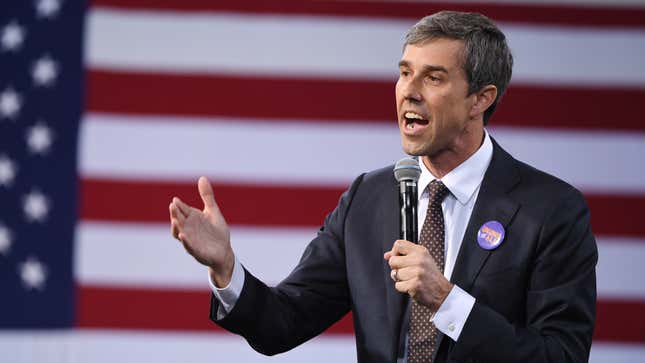Beto O'Rourke Will Never Fail
Politics

Former congressman and current presidential hopeful Beto O’Rourke is the star of yet another lengthy media profile, this time courtesy of the New Yorker. The piece, which clocks in at over 9,400 words, follows O’Rourke on the campaign trail and asks what has become the prevailing question of O’Rourke’s time in the presidential ring: “Can Beto Bounce Back?”
As the race to the White House trudges forward, O’Rourke has inarguably become something of an afterthought. His failed—but valiant—senate race against Senator Ted Cruz made him a household name and a new Democratic darling. And he was able to ride the loss into an unexpected presidential campaign, which earned a whopping $6.1 million dollars in donations within the first 24 hours. But the honeymoon period appears to have ended. Real Clear Politics has O’Rourke polling at an average of 3.7 percent, hovering just above contenders like Corey Booker and Amy Klobuchar and behind the new It-Guy, Pete Buttigieg.
But Beto’s actual standing is pretty inconsequential compared to the glossy treatment he has received. As the New Yorker piece noted, the “media consensus” is that O’Rourke is “a handsome lightweight, an entitled child of privilege who has ‘failed up’ all his life”—pretty ironic considering that big-name media outlets, including the New Yorker, are complicit in O’Rourke’s consistent upward failing. Countless think pieces have functioned as life support and free PR for O’Rourke’s failed campaigns. It’s a gift that a similarly low polling candidate like Senator Kirsten Gillibrand has yet to receive.
Countless think pieces have functioned as life support and free PR for O’Rourke’s failed campaigns.
Survey this New Yorker profile, the Vanity Fair cover story that launched his presidential campaign, and the upcoming HBO documentary Running with Beto, the charge that prestige media’s fascination with O’Rourke has helped him fail up becomes difficult to combat. Just like it’s similarly difficult to imagine a world in which O’Rourke would receive this level of continued fascination if he wasn’t a tall white man with a nice smile.
Compare this glitzy, in-depth coverage to, say, the ink spilled on Elizabeth Warren or Kamala Harris, two senators with long, successful careers who are running for president and boast higher poll numbers than O’Rourke. Sure, there have been profiles of them here and there, but Harris hasn’t gotten the magazine cover treatment since announcing her candidacy, and Warren only scored a Time cover story within the last month (one week after newcomer Buttigieg graced the cover with his husband). For much of March and April, O’Rourke received more cable news coverage than both of them.
And if we’re looking for a redemption narrative, like O’Rourke, former Georgia gubernatorial candidate Stacy Abrams ran against a Republican in a red state in 2018 and lost. Would she receive the kind of glittering media spotlight O’Rourke has garnered if she threw her hat into the 2020 ring? If her campaign looked promising before fizzling out a couple of months later, would we still expect to see big features about how she’s getting back on track? Perhaps, but it’s doubtful.
Black women like Abrams are afforded fewer opportunities to fail, let alone have their failures depicted as character building or a fascinating personality trait. That’s not the case for O’Rourke.
This isn’t to say that O’Rourke isn’t doing what these profiles say he is. He is hard at work reviving his campaign: he’s been on the road for months, speaking at college campuses, attending dozens of town halls, and standing on many restaurant countertops. But even the twilight of O’Rourke’s campaign has been chronicled with reverence and melancholy.At this juncture, O’Rourke’s 2020 viability appears to rest on his story—one of a plucky punk turned politico who attempted to disrupt the Texas GOP machine. Whether he’s remotely qualified, or well suited for a presidential role is secondary to the endearing image of O’Rourke the underdog with rolled up sleeves and an impromptu diatribe about white-male privilege at the ready.
Because the people writing (and assigning) these articles see O’Rourke’s actions as endearing struggles, rather than career ending moments, they’re metabolized as such—the very definition of privilege that props up white men. As long as O’Rourke’s failures continue to be characterized as compelling bumps in the road of his hero’s journey, his campaign malaise is intriguing, rather than a moment for dismissal. If Warren’s or Harris’s poll numbers drop significantly, and we get 10,000-word profiles in return, perhaps I’ll eat these words, but I’m not counting on it.